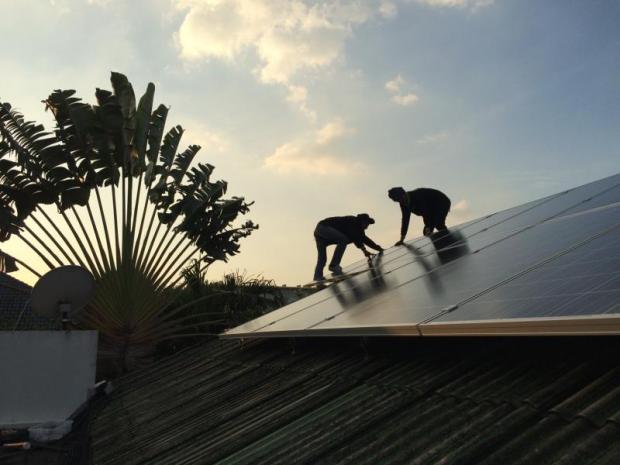
With the cost of installing solar rooftops dropping substantially and energy firms offering several types of business models to encourage consumers, home and building owners are taking advantage of the clean power source, even as energy policymakers have not yet finalised regulations to let private solar rooftop owners sell power to state utilities.
Owners of factories, buildings and residences have installed solar rooftops to produce their own power and cut back on expenses.
In the past, many thought solar rooftop installations were not worth the investment because of the high costs and inability to sell power back to state utilities.
But falling development costs for solar rooftop systems, incentives from energy firms and increased public consciousness of greenhouse gas emissions is causing the power source to gain in popularity.
There is no exact data showing the amount of solar power being produced from these private rooftop installations, since they are off-grid systems. But the Energy Regulatory Commission (ERC) said their presence should help prevent power demand from hitting new highs this year.
Normally Thai power demand peaks every year during the hot season, when air-conditioner use spikes, but additional supply from renewable power, particularly solar farms, has helped prevent demand from reaching new heights.
With falling development costs, the break-even period for those who have invested in solar power has shortened from 15 years in 2012 to eight years in 2016 to five years now, said Prof Dusit Kruangam, chairman of the Thai Photovoltaic Industries Association.
"There is no need to subsidise solar farms anymore, and that is the reason why nobody is waiting on the government policy to free up the system," Prof Dusit said. "They can start developing their own solar farms and solar rooftops now, since the costs have already been cut."
Suvit Toraninpanich, deputy secretary-general of the Federation of Thai Industries, said many solar rooftop installation businesses will emerge to meet rising demand.
Such firms have already started popping up, offering attractive business models to woo consumers.
These firms have guaranteed a drop in power expenses for those who use solar power rooftop installations, including Banpu Infinergy Co and Solar Power Roof Co, which have received a warm welcome from consumers.
Mr Suvit said the rising popularity of solar rooftops and the development of new power storage technology will be a "game changing" factor that turns the Thai power industry upside down, since it makes renewable power more competitive with fossil-based power.
He said the current trend should make renewable energy a viable competitor with fossil fuels within a decade.
Wichsinee Wibulprasert, a research fellow at the Thailand Development Research Institute, said more people could rush to install solar rooftops before year-end, when Board of Investment privileges are granted to related investors.
ERC commissioner Viraphol Jirapraditkul said the commission is studying the effects of off-grid power from rooftops and other off-grid power from fossil fuels, as such capacity is rising each year.
"The exact capacity of off-grid power has not been recorded, but we need to monitor it because it could greatly effect the country's long-term power development plan," Mr Viraphol said.
Big businesses, particularly department stores and factories, have installed their own solar rooftop systems, helping cut power costs to only three baht per kilowatt-hour (unit), compared with four baht per unit for power bought from state utilities, he said.
The price gap has made the ERC and policymakers anticipate a further decline in demand in power from the grid.
Another ERC commissioner, Kraisi Karnasuta, said rooftop programmes offered by companies are fast becoming popular, which will lead to a sharp drop in revenue for the Electricity Generating Authority of Thailand and other major private power producers.
Mr Kraisi said the cost of power generated from solar rooftops is two baht per unit. That figure is well below the four baht per unit that consumers pay to state utilities.
He said the cost of solar power is expected to decline further and will be more competitive if new power storage technology arrives.
Wandee Khunchornyakong, chief executive of SET-listed SPCG Plc, which has spearheaded Thailand's solar power sector, said factories should install their own solar power systems to immediately reduce energy bills.
She said solar rooftop systems will also offset the need to built new power plants to serve rising energy demand.
SPCG is educating the public on the benefits of solar rooftop installations to further popularise the energy source.